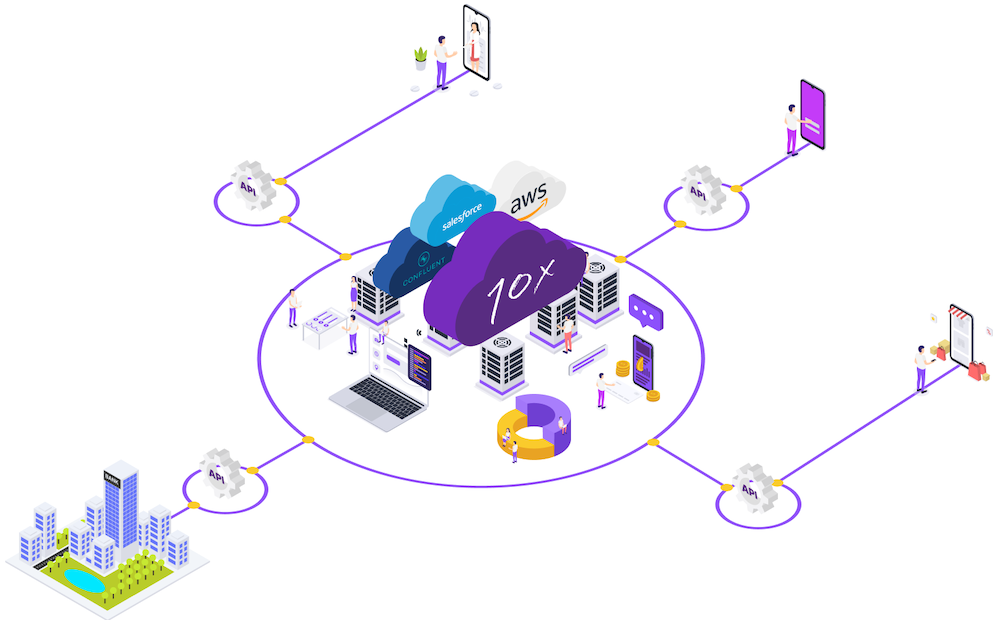The perception that banks are in constant battle with FinTech startups is outdated. The true picture reveals business growth via collaboration, combining unique attributes to create better financial services. Banks have banking licences, access to capital and mature risk management practices, as well as time-tested business resilience. Non-bank FinTech brands have compelling user interfaces, innovative propositions, and a way of engaging new customer segments in new ways. The synergies are obvious and powerful.
The connecting force that aligns the two – Banking-as-a-Service (BaaS) – is the process that enables banks and non-bank FinTechs to work as collaborators for the provision of embedded finance and traditional banking services such as payments, deposit taking, and lending in non-traditional ways.
We at 10x have long seen BaaS as the future of financial services. We still do. Banks want to create new revenue streams by entering untapped market segments, lower their costs of customer acquisition, and keep pace with customer expectations by rapidly launching new, affordable services. They also want to stay in step with regulators whose perception and expectation is maturing often faster than the market’s.
Non-bank brands are looking to launch differentiated products and services, offering embedded financial capabilities to nurture deeper relationships with customers. This means smoother payment experiences, enabling higher conversion with credit offers, and helping people plan for the future.
What both parties have in common is a desire to do things at speed, cost-effectively and securely. The opportunities for increased market penetration and customer acquisition are now, not tomorrow. Implementing a cloud native BaaS core banking platform ensures nobody gets left behind in the true battle: being future-proof in a constantly innovating marketplace. It will provide unique speed-to-market and unprecedented scalability and resilience when you get there.
What does BaaS mean for each party?
Banks need a flexible, modular core banking platform that enables them to transform their business models. It needs to be highly configurable, multi-tenanted, fast, secure and scalable. This means banks and their partners can be quick to market, launching new, highly adaptable products in minutes not months, and with a significantly lower total cost of ownership.
Payments and debit card functionality should be built in and financial crime and fraud screening integrated and out-of-the-box. And a Salesforce customer servicing platform ready to go. Onboarding customers to the right AML standard needs to be digital-first and simple.
A BaaS core banking platform provides the bank with a set of client APIs for speedy integration into partners’ mobile and web channels, and for new players a white label mobile application. For these partners, it means the super-fast launch of differentiated products and services. For example, current accounts, savings accounts, term deposits, unsecured and secured loans, all with improved customer interaction. Services are compliant, and enterprise-grade security standards provide peace of mind.
BaaS is a game-changer in financial services, and we’ve understood its potential from the outset. We saw how a range of players – from established banks looking to diversify traditional business models, to a diverse range of high-growth players looking to leverage their banking licence to offer a BaaS product – could reap the rewards of future-proof financial innovation and speed to market.
10x helps banks deploy BaaS propositions, but we also encourage them to do it now and do it fast, unhindered by legacy technology. BaaS is an enabler in this era of partnership and collaboration. There is no battle. 10x SuperCore™ is the binding force that transforms banks and FinTechs into collaborative, resilient, quick, agile, major players in the market. And there’s no better time to do it than now.
Want to learn more? Read our case study about the work 10x has done with Westpac to bring a new Banking-as-a-Service platform to the banking group.



